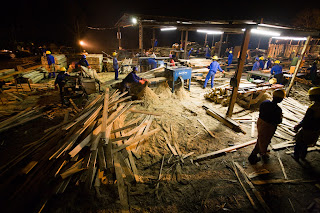By: Theresia Whitfield
 |
| Skumbuzo at the sawmill |
Imagine growing up in a close-knit community only to watch your town virtually disappear. The few citizens that remain are suffering for lack of the basics but more than that; they turn to crime to compensate for the lack of jobs. Now imagine watching that same town completely revitalized with new opportunities for business, education, health and hope.
 |
| One of the ladies at the sawmill preparing logs to be sawed |
Skumbuzo Dlamini has seen both of these scenarios come to life. He was born and raised in Bulembu amid the hay-day of what was a bustling town with a vibrant and active mine company providing for 10,000 residents. When the mine shut its doors in 2001, Skumbuzo watched as practically everyone he knew left to try to find a new life. But Skumbuzo and his family had nowhere to go. They stayed, watching Bulembu fall into disarray and become a ghost town.
 |
| Sawmill during the night shift |
Today Skumbuzo is able to smile about life in Bulembu because it is a happy place once again. When Bulembu Ministries Swaziland arrived in 2006, Skumbuzo says he felt that God had answered his prayers. He began working in security, following in the footsteps of his father. (His mother and grandfather both worked in the mine.) Eventually, he ended up at Bulembu Sawmill, which has been operational since 2004.
 |
| Workers at sawmill |
Neal Rijkenberg, who once owned the sawmill, turned it over to BMS in 2006 so that the Swazi people could run it exclusively for the benefit of the town and country. The primary function of the sawmill is to maintain profitability in order to financially assist the Child Care Program. According to Kurt Puttkammer, the Forestry Manager in Bulembu, duties range from manually loading the conveyors with round logs, operating basic machinery to packing the final product into bundles. Forklift drivers, a maintenance team and Bell loggers are also employed at the sawmill.
 |
| One of the Bell loaders loading a truck |
“The sawmill offers timber for sale to the surrounding community at very cheap prices,” said Kurt.
Skumbuzo has also seen a lot of change at the sawmill since he began working there. What started as a small group of people, there are now more than 120 people who work at the sawmill, including 16 who are employed at the charcoal plant. The newest addition to the sawmill is a wood chipper that is used to chip waste coming from the mill and is then sold to the sugar mills in Swaziland. And Skumbuzo has also become the General Manager.
 |
| Skumbuzo showing worker how to work machinery |
Skumbuzo and Kurt said that the sawmill is always looking for new markets and ideas that will make Bulembu Sawmill a more efficient operation. All Bulembu forests are forestry stewardship council certified, which allows for some export to Holland and Belgium. Those items being exported include the harder Eucalyptus species such as Paniculata and Cloeziana, which are rot resistant and often used in wet areas for walkways and outdoor furniture.
 |
| Worker sorting off-cuts |
Skumbuzo, who is married and has two children, beams with joy when talking about what he feels is a tremendous future for his own family and that of his employees.
“Each morning before we begin work, we pray,” he said. “I tell them we need to respect our jobs. I tell them to work hard and as one team so that their children won’t have to suffer.”
 |
| Skumbuzo |































